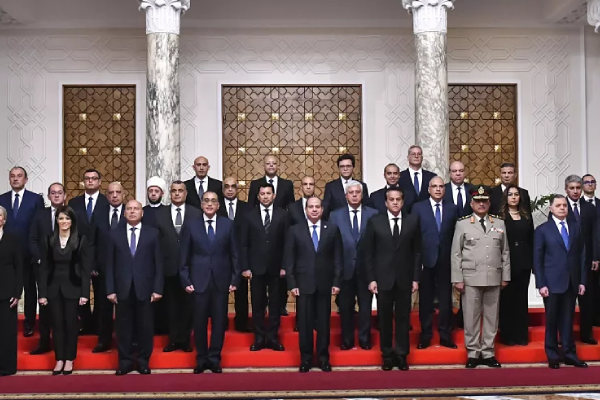Egypt’s New Cabinet: A Strategic Reformation Amidst Economic and Regional Turbulence
In a significant governmental overhaul, Egypt has sworn in a new cabinet in Cairo, navigating the tumultuous waters of a faltering economy and regional conflicts. Under the guidance of Prime Minister Mustafa Madbouly, who has held office since 2018, substantial changes have been made, particularly in the defense and economics sectors, reflecting a strategic pivot to address the country’s manifold challenges.
Background and Economic Context
The Egyptian economy has been under severe strain from years of economic mismanagement, the debilitating effects of the COVID-19 pandemic, and the economic fallout from ongoing conflicts in Europe and the Middle East. The implementation of austerity measures in 2016, as part of a reform agenda endorsed by Western allies and President Abdel Fattah el-Sissi, exacerbated the economic woes by driving up living costs. Currently, nearly 30% of Egyptians are living below the poverty line, according to official estimates.
To combat these economic challenges, the government earlier this year made critical adjustments, including the flotation of the Egyptian pound and a sharp hike in the main interest rates. Despite these measures, the nation is still grappling to revive its tourism industry, which has been crippled by years of political unrest, the pandemic, and recent conflicts across Europe and the Middle East.
Key Changes in the New Cabinet
One of the most notable shifts in the new cabinet is the appointment of Sherif Fathy as the Minister of Tourism and Antiquities, replacing Ahmed Issa. Fathy, a former civil aviation minister, is tasked with the formidable challenge of rejuvenating Egypt’s tourism sector, a pivotal component of the national economy.
Energy issues, particularly recurring power outages during the intense summer heat, have also been a significant point of public discontent. In response, Mahmoud Esmat has been appointed to manage the Ministry of Electricity, a role crucial for maintaining stability in a country of over 106 million people.
Diplomatic Reorientations
On the international front, the foreign ministry’s leadership has also seen a change. Badr Abdelatty, a seasoned diplomat with experience as Egypt’s envoy to European nations such as Germany and Belgium, has been named the new Foreign and Migration Minister. He succeeds Sameh Shoukry, who has spearheaded Egypt’s diplomatic initiatives for the past decade. This change comes at a critical time, with conflicts raging in neighboring Gaza, Libya, and Sudan, and underscores Egypt’s continued focus on substantial diplomatic engagements.
Defence Sector Modifications
The defense ministry has also witnessed a crucial change with General Abdel-Majeed Sakr taking over from General Mohamed Zaki, who had held the position since June 2018. Sakr’s appointment reflects a broader strategy of restructuring and fortifying the nation’s defense mechanisms amid regional instabilities.
The Road Ahead
The swearing-in ceremony took place in a presidential palace in Cairo, where President el-Sissi, who was re-elected for a third six-year term last December, officiated the new government officials. The revamped cabinet includes a diverse group of four women and several technocrats, aiming for a more inclusive and expert-driven administration.
Prime Minister Madbouly, entrusted by el-Sissi to form the new government, faces the daunting task of steering Egypt through its current economic and regional challenges. With these strategic cabinet appointments, the government aims to stabilize the economy, enhance public services, and boost Egypt’s position on the international diplomatic stage.
As the new cabinet embarks on this crucial journey, the eyes of over 106 million Egyptians, along with international observers, remain keenly focused on how these changes will translate into tangible improvements in their daily lives and Egypt’s standing in the global arena. For more information, you can visit the Egyptian Government’s official website.
In summary, Egypt’s new cabinet represents a calculated response to intricate domestic and international challenges, focusing on economic recovery, energy stability, and strengthened diplomatic efforts.
